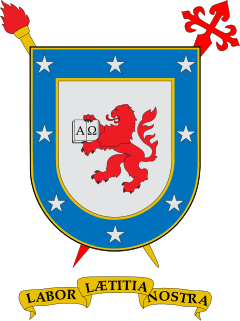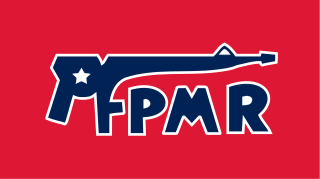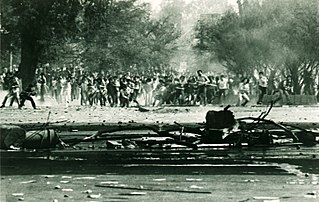Related Research Articles

The University of Santiago, Chile (Usach) is one of the oldest public universities in Chile. The institution was born as Escuela de Artes y Oficios in 1849 by Ignacy Domeyko, under the government of Manuel Bulnes. It became Universidad Técnica del Estado in 1947, with various campuses throughout the country. In 1981, as a consequence of a reform on higher education under the dictatorship of Augusto Pinochet, it became what is now known as Universidad de Santiago de Chile, with all activities centered in a single 340,000 m2 campus in the capital Santiago.
The Valech Report was a record of abuses committed in Chile between 1973 and 1990 by agents of Augusto Pinochet's military regime. The report was published on November 29, 2004 and detailed the results of a six-month investigation. A revised version was released on June 1, 2005. The commission was reopened in February 2010 for eighteen months, adding more cases.

The Manuel Rodríguez Patriotic Front, was a Chilean revolutionary and Marxist-Leninist guerrilla organisation officially founded on 14 December 1983 as the paramilitary arm of the Communist Party of Chile (CPCh) in the context of this party policy denominated as the "Política de Rebelión Popular de Masas", created with the goal of a violent overthrow of the civic-military dictatorship of general Augusto Pinochet.
The 2006 student protests in Chile were a series of ongoing student voice protests carried out by high school students across Chile from late April to early June 2006. The protests peaked on May 30 when 790,000 students adhered to strikes and marches throughout the country, becoming Chile's largest student demonstration of the past three decades and the first political crisis of president Michelle Bachelet's administration.
The Chilean transition to democracy began when a Constitution establishing a transition itinerary was approved in a plebiscite. From March 11, 1981 to March 1990, several organic constitutional laws were approved, leading to the final restoration of democracy. After the 1988 plebiscite, the 1980 Constitution was amended to ease provisions for future amendments to the constitution, create more seats in the senate, diminish the role of the National Security Council, and equalize the number of civilian and military members.
Carmelo Soria was a Spanish-Chilean United Nations diplomat. A member of the CEPAL in the 1970s, he was assassinated by Chile's DINA agents as a part of Operation Condor. Augusto Pinochet was later personally indicted over this case.

Problems related to human rights in Chile include discrimination against indigenous populations; societal violence and discrimination against women, children, and lesbian, gay, bisexual, and transgender (LGBT) people; child labor; and harsh prison conditions and treatment. Additional human rights concerns in the country include use of excessive force and abuse by security forces, isolated reports of government corruption, and anti-Semitism. Authorities generally maintain effective control over the security forces. However, security forces occasionally commit human rights abuses. The government generally takes steps to prosecute officials who commit abuses. Nevertheless, many human rights organizations contend that security officials accused of committing abuses have impunity.

Coordinadora Arauco-Malleco (CAM) is an indigenous organization advocated to the creation of an autonomous Mapuche state in Araucanía, which is, they say, the revindication and recovery of former Mapuche lands. They are mostly renowned for their violent methods, often recurring to arsony and armed attacks against "Fuerzas Especiales" of Carabineros de Chile. It was founded in 1998, in Tranaquepe, Chile, and is responsible for land occupation in the zones of Tirúa, Contulmo, Cañete and Temucuicui. Protesters from radicalized Mapuche communities have used these tactics against multinational forestry corporations and private individuals backed by CAM paramilitary power as a form of exerting political pressure.

Jorge Félix Arrate Mac Niven is a Chilean lawyer, economist, writer and politician. He was the Minister of State for the Chilean presidents Salvador Allende, Patricio Aylwin, and Eduardo Frei Ruiz-Tagle. In 2009, he was appointed as candidate for president of Chile in representation of the political alliance Juntos Podemos Más and other leftist political movements, obtaining 6.21 percent of the total votes in the elections of that year.

The Mapuche conflict is the name given to the conflict originated from the claims of indigenist Mapuche communities and organizations to the States of Chile and Argentina. The activist in favor of the 'Mapuche cause' claim greater autonomy, recognition of rights, and the 'recovery' of land since the Chilean transition to democracy.

The 2011 Magallanes protests were a series of protests provoked by the rising of natural gas prices in the Chilean region of Magallanes, in January 2011. The conflict ended on January 18, when Laurence Golborne and the Citizens Assembly of Magallanes reached an agreement.

The 2011–2013 Chilean protests – known as the Chilean Winter or the Chilean Education Conflict – were a series of student-led protests across Chile, demanding a new framework for education in the country, including more direct state participation in secondary education and an end to the existence of profit in higher education. Currently in Chile, only 45% of high school students study in traditional public schools and most universities are also private. No new public universities have been built since the end of the Chilean transition to democracy in 1990, even though the number of university students has swelled.

Following the 1973 Chilean coup d'état, an armed Leftist resistance movement against Augusto Pinochet's dictatorship developed until 1990 when democracy was restored. This conflict was part of the South American theater in the Cold War, with the United States backing the Chilean military and the Soviet Union backing the guerrillas. The main armed resistance groups of the period were the Revolutionary Left Movement (MIR) and Frente Patriótico Manuel Rodríguez (FPMR), the armed wing of the Communist Party of Chile. These groups had a long-standing rivalry, including over Marxist orthodoxy.

The anarchist movement in Chile emerged from European immigrants, followers of Mikhail Bakunin affiliated with the International Workingmen's Association, who contacted Manuel Chinchilla, a Spaniard living in Iquique. Their influence could be perceived at first within the labour unions of typographers, painters, builders and sailors. During the first decades of the 20th century, anarchism had a significant influence on the labour movement and intellectual circles of Chile. Some of the most prominent Chilean anarchists were: the poet Carlos Pezoa Véliz, the professor Dr Juan Gandulfo, the syndicalist workers Luis Olea, Magno Espinoza, Alejandro Escobar y Carballo, Ángela Muñoz Arancibia, Juan Chamorro, Armando Triviño and Ernesto Miranda, the teacher Flora Sanhueza, and the writers José Domingo Gómez Rojas, Fernando Santiván, José Santos González Vera and Manuel Rojas. At the moment, anarchist groups are experiencing a comeback in Chile through various student collectives, affinity groups, community and cultural centres, and squatting.

Camilo Marcelo Catrillanca Marín was a Mapuche farmer from Ercilla in Chile who was shot to death by the Chilean police force. The incident led to protests against police violence, and occurred in the broader context of the ongoing conflict over Mapuche civil rights.

Civil protests have taken place throughout Chile in response to a raise in the Santiago Metro's subway fare, the increased cost of living, privatisation and inequality prevalent in the country. Due to the magnitude and diversity of these manifestations, they are referred to by Chilean media as an estallido social.

Violeta Zúñiga was a Chilean human rights activist who was part of the Agrupación de Familiares de Detenidos Desaparecidos during the Military Dictatorship of Chile (1973-1990) until her death. She was also a member of the folk dance group, "Cueca sola", in which she participated more than a hundred times as a dancer, commemorating those who disappeared in Chile.

The COVID-19 pandemic in Chile is part of the worldwide pandemic of coronavirus disease 2019 caused by severe acute respiratory syndrome coronavirus 2. The virus was confirmed to have reached Chile in March 2020. While initial cases had been imported from Southeast Asia and Europe, they have since expanded into a sizeable quantity of untraceable infections, placing the country within phase 4 of the pandemic as defined by the World Health Organization, and surpassing one thousand confirmed cases on 25 March 2020.
Primera Línea is the name for a loose collective of protesters dedicated to physically confronting Chilean riot police in the context of the 2019–20 Chilean protests. In the words of a member "it's about contesting [state] power". The Primera Línea is made up of an assortement of individual citizens and grassroots organizations called "clans", lacking central authority. A wide range of sympathetic organizations support Primera Línea providing them with aid, food and legal advice. Members are of diverse backgrounds, including labourers, immigrants, university students and sports fans.

The 2019–2020 Chilean protests are characterised by widespread eye injuries, including many globe ruptures, among protesters as result of Chilean riot police's use of "rubber" bullets and tear gas grenades. Data from the National Institute of Human Rights (INDH) shows that the use of "rubber" bullets and pellets by security forces has left at least 1863 injured, including 268 with eye problems. According to the Chilean Ophthalmology Society, this is the highest number of injuries of this type registered during protests or in conflict zones in the world. In late November, security forces announced the suspension of the use of "rubber" pellets as a crowd control method in the protests. The INDH updated figures at the end of January 2020 reporting that 427 persons had received eye injuries at the hands of the police. Almost 90% of the injured are men. As of early January 2020 the age of injured goes from 14 to 59 years, and averages 28 years.
References
| This article article about the history of Chile is a stub. You can help Wikipedia by expanding it. |